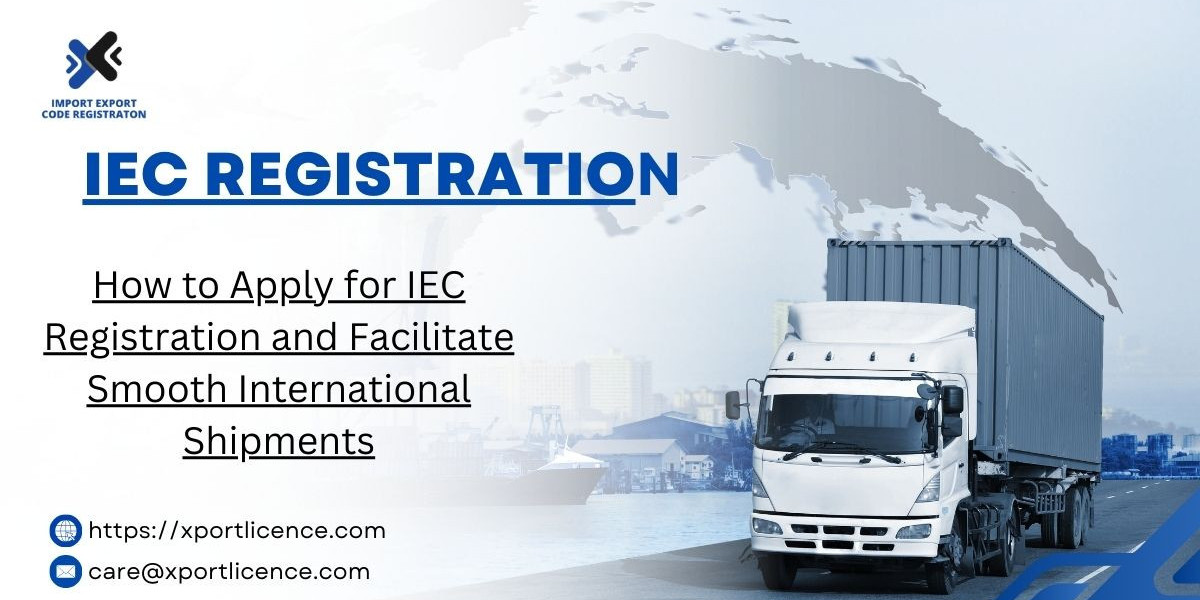If you're planning to expand your business to international markets, one of the essential steps you’ll need to take is applying for IEC online registration. This code is a unique 10-digit number issued by the Directorate General of Foreign Trade (DGFT), Ministry of Commerce, Government of India, and it is a mandatory requirement for anyone involved in importing or exporting goods and services from India.
Whether you are a small business owner, entrepreneur, or large company, obtaining an IEC registration is the first step in ensuring that your shipments to international markets run smoothly. In this detailed guide, we will explain everything you need to know about IEC registration, the benefits it offers, and the process for obtaining it. This will help you ensure that your international shipments are hassle-free and comply with the legal requirements for doing business overseas.
What is an Import Export Code (IEC)?
An Import Export Code (IEC) is a unique identification number issued to individuals or businesses that are involved in importing or exporting goods and services in India. It is issued by the Directorate General of Foreign Trade (DGFT) and is used to track the movement of goods and services across borders. The IEC is required for businesses that want to export products or services to other countries or import products from foreign markets.
This code is necessary for completing customs procedures and ensuring smooth international shipments. The IEC number is a lifetime valid code and does not require renewal unless there is a change in the business details.
Why is IEC Registration Important for International Shipments?
When you plan to engage in cross-border trade, whether importing or exporting, IEC registration becomes vital for several reasons:
Legal Requirement:
Without an IEC, you cannot legally import or export goods or services in India. This is mandated by the government to regulate trade activities and ensure proper customs clearance.
Customs Clearance:
The IEC is required for customs clearance during international shipments. Customs authorities need this number to verify the shipment details, ensuring that your goods are compliant with the country's regulations.
Access to Global Markets:
With an IEC, you gain access to the global market, allowing you to expand your business and reach customers internationally.
Eligibility for Duty Exemptions:
An IEC allows you to benefit from various export incentives offered by the Indian government, including duty exemptions under various schemes, such as the MEIS (Merchandise Exports from India Scheme).
Bank Transactions:
Most banks require an IEC before facilitating foreign exchange transactions or handling payments for international trade. This ensures that payments are processed legally.
Seamless Trade Facilitation:
The IEC registration simplifies the process of conducting international trade, making your shipments smoother and more efficient. You won’t face delays or disruptions due to missing paperwork.
Who Needs IEC Registration?
IEC registration is mandatory for anyone engaged in the following activities:
Exporters: If you are a business owner or entrepreneur involved in exporting goods or services to other countries, you must have an IEC.
Importers: Businesses or individuals involved in importing goods or services into India must also apply for an IEC.
Freelancers: Freelancers and consultants providing services to international clients (like IT services, software development, cand onsultancy) need an IEC for legal transactions and smooth cross-border payments.
Documents Required for IEC Registration
When applying for an IEC registration, you will need to submit certain documents to the Directorate General of Foreign Trade (DGFT). Here’s a list of the required documents:
PAN Card: A Permanent Account Number (PAN) card of the applicant or the business entity (for sole proprietors, companies, or partnerships).
Aadhaar Card: The Aadhaar number of the applicant or authorized signatory for identity verification. (For individual proprietors, Aadhaar is mandatory).
Business Proof: If you are applying as a company or partnership, you will need to submit a Certificate of Incorporation, Partnership Deed, or LLP Agreement as proof of your business.
Address Proof: Proof of the applicant’s business address (e.g., utility bills, lease agreements, or bank statements).
Bank Account Details: A bank certificate or a canceled cheque from your business bank account. The account should be in the name of the business or the individual applying for the IEC.
Email ID and Phone Number: A valid email address and phone number are required for communication and further processing of your application.
Digital Signature: A digital signature is mandatory for submitting online applications for IEC registration.
Step-by-Step Process to Apply for IEC Registration
The process of applying for an IEC is straightforward and can be done online through the official DGFT portal. Here’s a step-by-step guide:
Visit the IEC Portal – Open the official IEC registration website on your browser.
Fill in the Application Form – Enter your business name, type, PAN number, and other required details carefully.
Submit the Application – Review all the details to ensure accuracy before submitting the form.
Pay the Registration Fee – Make the payment online using net banking, credit/debit card, or UPI.
OTP Verification – Enter the OTP sent to your registered mobile number or email for authentication.
Processing & Approval – The concerned authority will verify your details and process the application.
Receive Your IEC Code – Once approved, the IEC code will be sent to your registered email within 1-2 business days.
Key Tips for Facilitating Smooth International Shipments
Ensure Compliance with Import/Export Laws: Always ensure that the goods you are importing or exporting comply with the laws of the country involved. This includes paying attention to customs duties, import restrictions, and export documentation.
Work with a Reliable Freight Forwarder: To ensure smooth logistics, consider working with an experienced freight forwarder or shipping company that specializes in international shipments. They can handle documentation, customs clearance, and shipment tracking.
Check for Trade Agreements: India has several free trade agreements (FTAs) with countries. These agreements may allow you to export goods with reduced tariffs. Make sure to check if your products qualify for benefits under these agreements.
Maintain Proper Documentation: Keep all necessary documentation, such as invoices, packing lists, bills of lading, and certificates of origin, ready for customs clearance to avoid delays.
Monitor Payments and Currency Exchange: For international transactions, ensure that you have a clear understanding of the currency exchange rates and payment terms (such as letters of credit, advance payments, or post-shipment payments).
Suggested read: How to Obtain an Import Export Code (IEC) or Export License?
Conclusion
Obtaining an IEC (Import Export Code) registration is a vital first step in expanding your business internationally. With an IEC, you will be able to import goods into India or export products to global markets legally and without hassle. The application process for IEC registration is straightforward, and it allows you to ensure smooth international shipments by fulfilling all necessary customs and legal requirements.
By following this guide and applying for IEC registration, you can open up a world of opportunities for your business in global markets, improve your supply chain, and create valuable international connections. Whether you're a small business looking to start exporting or a large company managing a global presence, having an IEC will make your international trade journey easier and more efficient.









